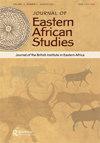2021年赞比亚大选前的法律独裁
IF 0.6
3区 社会学
Q2 AREA STUDIES
引用次数: 6
摘要
摘要2011年至2021年间,赞比亚经历了一次明显的民主倒退。专制是蓄意利用法律机制来增强行政权力的结果。这篇文章通过法律文件、新闻报道和线人采访追踪了关键的法律变化,探讨了最近的这一独裁事件,这是一个刚刚起步、松散的总统民主国家中制度化不力的政党制度造成的。我们表明,在爱国阵线的统治下,独裁是故意使用法律机制来增强行政权力、扼杀反对派、压制媒体和破坏民间社会力量的结果。2021年8月反对派候选人哈坎德·希奇莱马的当选可能结束了这一倒退,因为这是该国历史上第三次通过投票箱和平改变权力。但是,2021年的选举将在多大程度上使赞比亚摆脱这一独裁趋势尚不确定,因为该国政治机构的状况,在一个松散的总统民主国家中,政党制度化程度很差,可能会使其容易出现进一步的倒退。本文的主要贡献是记录法律战在独裁过程中的作用,以及它对赞比亚民主衰落的影响。本文章由计算机程序翻译,如有差异,请以英文原文为准。
Legal autocratisation ahead of the 2021 Zambian elections
ABSTRACT
Zambia experienced an episode of distinct democratic backsliding between 2011 and 2021. Autocratisation resulted from the deliberate use of legal mechanisms to enhance executive power. Tracing key legal changes through legal documents, press reports and informant interviews, the article examines this recent episode of autocratisation as a consequence of a poorly institutionalised party system in a fledgling and unconsolidated presidential democracy. We show that under PF rule, autocratisation resulted from the deliberate use of legal mechanisms to enhance executive power, stifle the opposition, muzzle the press and undermine civil society forces. The election of opposition candidate Hakainde Hichilema in August 2021 may have ended this episode of backsliding as for the third time in the country´s history, power changed peacefully through the ballot box. But, to what extent the 2021 elections will move Zambia away from this authoritarian trend is uncertain as the state of the country’s political institutions, hereunder a poorly institutionalised party system in an unconsolidated presidential democracy, may leave it vulnerable to further episodes of backsliding. The main contribution of this paper is the documentation of the role of lawfare in processes of autocratisation, and how integral it has been to the decline of democracy in Zambia.
求助全文
通过发布文献求助,成功后即可免费获取论文全文。
去求助
来源期刊

Journal of Eastern African Studies
AREA STUDIES-
CiteScore
3.30
自引率
7.10%
发文量
12
期刊介绍:
Journal of Eastern African Studies is an international publication of the British Institute in Eastern Africa, published four times each year. It aims to promote fresh scholarly enquiry on the region from within the humanities and the social sciences, and to encourage work that communicates across disciplinary boundaries. It seeks to foster inter-disciplinary analysis, strong comparative perspectives, and research employing the most significant theoretical or methodological approaches for the region.
 求助内容:
求助内容: 应助结果提醒方式:
应助结果提醒方式:


